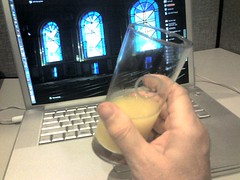I’m trying a new A.D.D. medication. My doctor things that I am too old to be taking Ritalin. So I feel a bit like I’m speaking out of somebody else’s head. It’s kinda weird and not very comforting — and I may just delete this part 😉
It’s my nature to try to factor things down to their fundamentals. This is not always good, because many things owe their value to their complexity. But, as a communicator, I try to bring concepts down to three bullet points, something that people can remember and then hang their own experiences and insights onto — a tune that people can hum.
All of this discussion about librarians and wikipedia is a gross simplification in itself. We are all struggling with an information revolution that is much greater than just the Wikipedia. I really like the word wikiphobia used by a commenter from yesterday’s mobile-post. I think that it is a matter of context, and the boundaries of these contexts that we speak from form in many ways. Perhaps the simplest way is time.
 Of course this too is fuzzy, but before the proliferation of networked, digital, and overwhelming information, the job of education was to
Of course this too is fuzzy, but before the proliferation of networked, digital, and overwhelming information, the job of education was to
teach children to read
and to
teach them what to read.
In today’s information environment, this is impossible, and even dangerous. When we are surrounded by information that can be presented to us by almost anyone for almost any reason, it is essential that while we teach students to read, we must also teach them to wisely, effectively, and responsibly make their own choices of what to read. The information that they encounter and use will be their choice, and if we continue to choose for them, then they will not learn, and we’re going to have a real mess. It’s literacy!
What’s even more disturbing to me, is the number of educators who have no idea that all of this is going on!
Image Citation:
Patrick, Michael. “Waiting to Go Back In.” Michael Patrick’s Photos. 24 Sep 2005. 2 Nov 2006 <http://flickr.com/photos/michaelpatrick/46220722/>.
technorati tags:warlick, education, literacy, library, librarian, techforumwa06, sljsummit06, sljsummit
Blogged with Flock

